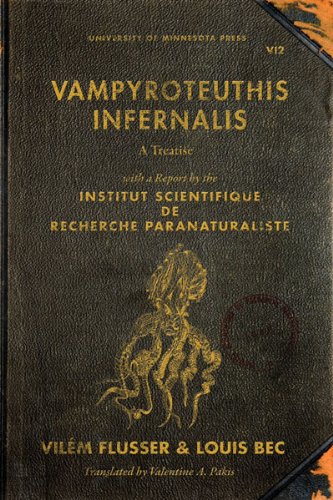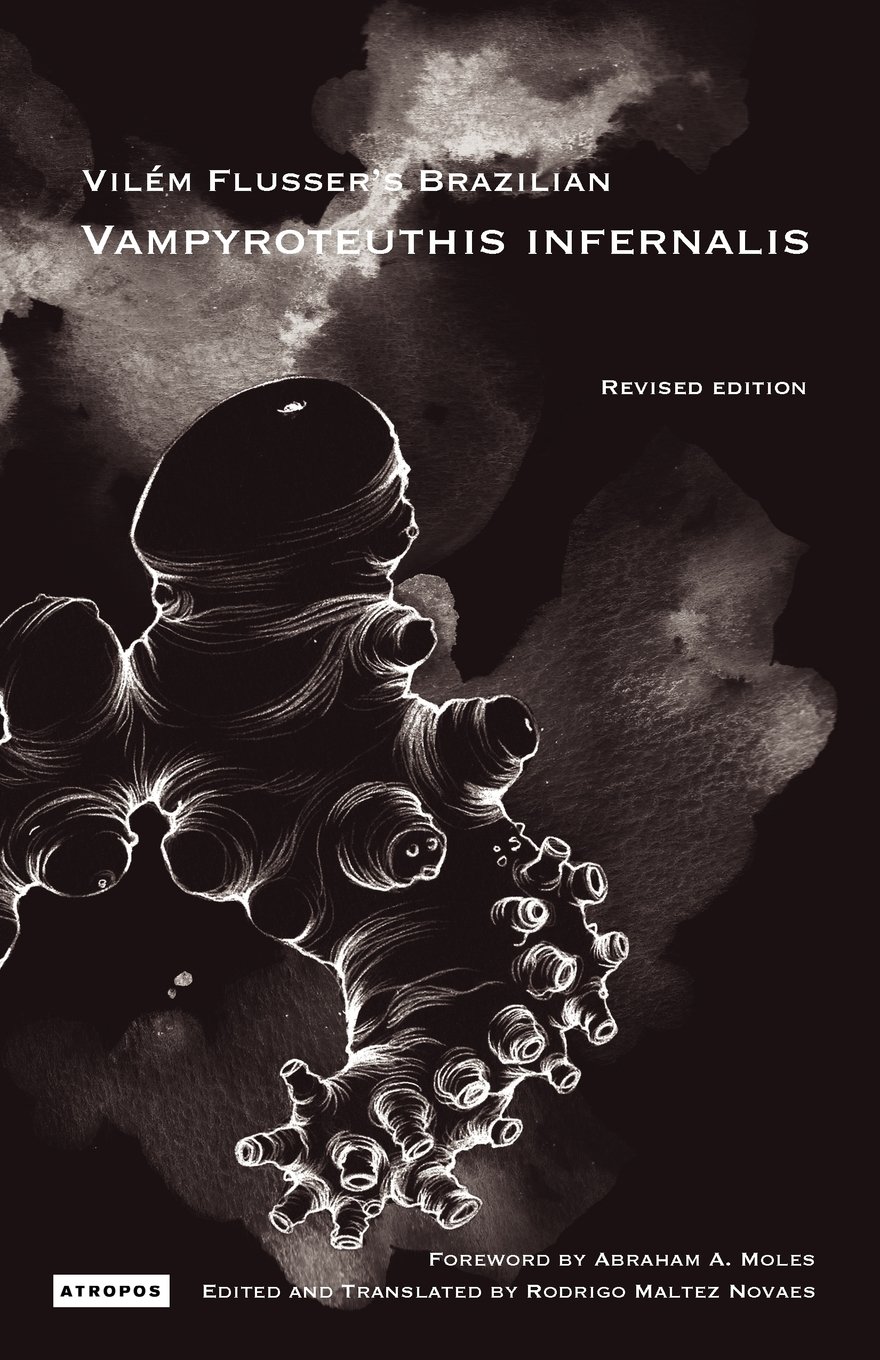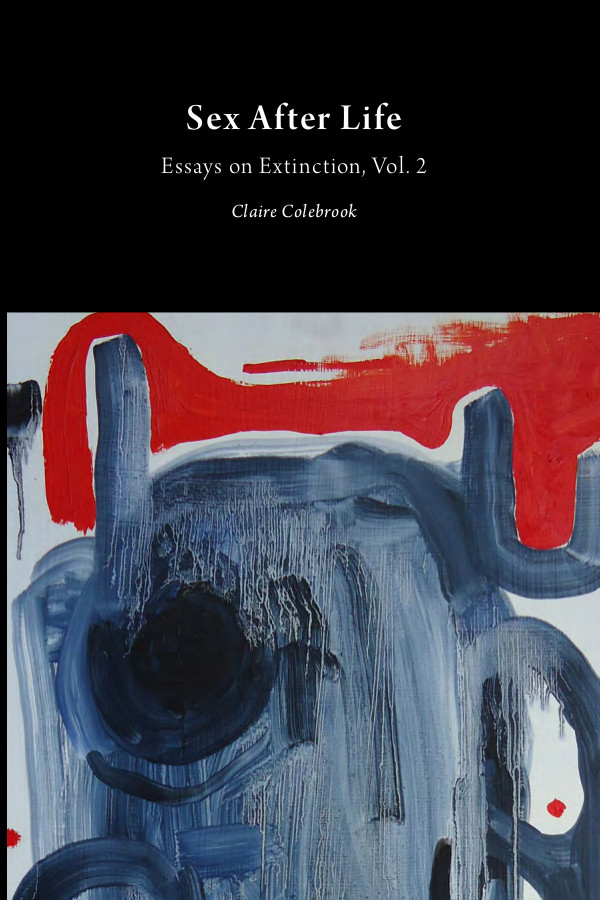Vilém Flusser, Louis Bec: Vampyroteuthis Infernalis: A Treatise, with a Report by the Institut Scientifique de Recherche Paranaturaliste (1987–)
Filed under book | Tags: · animal, art, biology, communication, human, philosophy


“How far apart are humans from animals—even the “vampire squid from hell”? Playing the scientist/philosopher/provocateur, Vilém Flusser uses this question as a springboard to dive into a literal and a philosophical ocean. “The abyss that separates us” from the vampire squid (or vampire octopus, perhaps, since Vampyroteuthis infernalis inhabits its own phylogenetic order somewhere between the two) “is incomparably smaller than that which separates us from extraterrestrial life, as imagined in science fiction and sought by astrobiologists,” Flusser notes at the outset of the expedition.
Part scientific treatise, part spoof, part philosophical discourse, part fable, Vampyroteuthis Infernalis gives its author ample room to ruminate on human—and nonhuman—life. Considering the human condition along with the vampire squid/octopus condition seems appropriate because “we are both products of an absurd coincidence . . . we are poorly programmed beings full of defects,” Flusser writes. Among other things, “we are both banished from much of life’s domain: it into the abyss, we onto the surfaces of the continents. We have both lost our original home, the beach, and we both live in constrained conditions.”
Thinking afresh about the life of an “other”—as different from ourselves as the vampire squid/octopus—complicates the linkages between animality and embodiment. Odd and strangely compelling, Vampyroteuthis Infernalis offers a unique posthumanist philosophical understanding of phenomenology and opens the way for a nonphilosophy of life.”
First published as Vampyroteuthis infernalis. Eine Abhandlung samt Befund des Institut Scientifique de Recherche Paranaturaliste, Immatrix Publications, Göttingen, 1987.
English edition
Translated by Valentine A. Pakis
Publisher University of Minnesota Press, 2012
Posthumanities series
ISBN 9780816678211
104 pages
Another English translation, from the original, unpublished and extended Brazilian-Portuguese version of the manuscript found at the Vilém Flusser Archive at UDK, Berlin
Edited and Translated by Rodrigo Maltez Novaes
With a Foreword by Abraham A. Moles
Publisher Atropos, New York and Dresden, 2011
Interventions series
ISBN 9780983173410
158 pages
Reviews: Colin Dickey (Los Angeles Review of Books, 2012), Lidia Zuin (n.d.).
Publisher: Minnesota UP, Atropos
WorldCat: Minnesota UP, Atropos
PDF (trans. Valentine A. Pakis from DE book, 2012, 10 MB, no OCR)
PDF, ARG (trans. Rodrigo Maltez Novaes from BR-PT manuscript, 2011)
Claire Colebrook: Essays on Extinction, 2 vols.: Death of the PostHuman & Sex After Life (2014)
Filed under book | Tags: · aesthetics, anthropocene, autopoiesis, critical theory, death, ecology, feminism, life, philosophy, posthuman, posthumanism, queer theory, sex, vitalism


“Death of the PostHuman undertakes a series of critical encounters with the legacy of what had come to be known as ‘theory,’ and its contemporary supposedly post-human aftermath. There can be no redemptive post-human future in which the myopia and anthropocentrism of the species finds an exit and manages to emerge with ecology and life. At the same time, what has come to be known as the human–despite its normative intensity–can provide neither foundation nor critical lever in the Anthropocene epoch. Death of the PostHuman argues for a twenty-first century deconstruction of ecological and seemingly post-human futures.”
“Sex After Life aims to consider the various ways in which the concept of life has provided normative and moralizing ballast for queer, feminist and critical theories. Arguing against a notion of the queer as counter-normative, Sex After Life appeals to the concept of life as a philosophical problem. Life is neither a material ground nor a generative principle, but can nevertheless offer itself for new forms of problem formation that exceed the all too human logics of survival.”
Publisher Open Humanities Press, 2014
Critical Climate Change series
Creative Commons BY-SA 3.0 License
ISBN 978-1-60785-299-5 (v1), 978-1-60785-300-8 (v2)
243 & 263 pages
Vol. 1: HTML, PDF, PDF, PDF
Vol. 2: HTML, PDF, PDF, PDF
Kathy Acker: Empire of the Senseless. A Novel (1988)
Filed under fiction | Tags: · appropriation, body, cyborg, gender, science fiction, sexuality

“Set in the near future, in a Paris devastated by revolution and disease, Empire of the Senseless is narrated by two terrorists and occasional lovers, Thivai, a pirate, and Abhor, part robot and part human. Together and apart, the two undertake an odyssey of carnage, a holocaust of the erotic. ‘An elegy for the world of our fathers,’ as Kathy Acker calls it, where the terrorists and the wretched of the earth are in command, marching down a road charted by Genet to a Marseillaise composed by Sade.” (from the back cover)
Publisher Grove Press, New York, 1988
ISBN 0802110797
227 pages
Commentary: Peter Wollen (London Review of Books, 1998).
PDF (18 MB, no OCR)
Comment (0)
